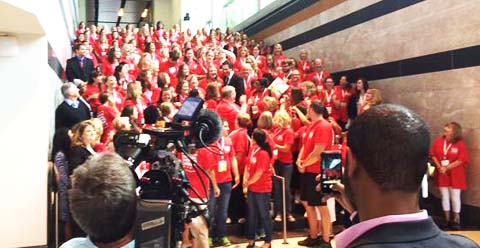Transforming Teaching at the 2015 Mickelson ExxonMobil Teachers Academy
By Guest Blogger
Posted on 2015-08-10
What happens when you bring together 150 third- through fifth-grade teachers from around the country for a week of the highest quality professional development around STEM? I found out last week at the 2015 Mickelson ExxonMobil Teachers Academy (MEMTA) in Jersey City, where a major shift in mindset rippled out across all 50 states, expanding like the “Cubes that Grow.” A force was set in motion with the power to transform lives; as teachers, we were asked to teach our students not “what to think” but “how to think.”
The Right Kind of Struggle
At MEMTA, the National Science Teachers Association (NSTA) prepared five full days of lessons to help teachers build knowledge in specific content areas while experiencing and analyzing the best practices in teaching the multi-dimensional Next Generation Science Standards (NGSS). Sprinkled throughout the week were inspirational talks by leading thinkers on the subject of how children learn. We began the week with Cathy Seeley, author of Faster Isn’t Smarter and Smarter Than We Think, who spoke about “The Right Kind of Struggle”–creating opportunities for students to work through challenging problems that can increase intelligence. As the week continued, we heard from Sam Shaw and NASA astronaut Leland Melvin; and on Thursday, we spent the afternoon with numerous ExxonMobil engineers.
Each MEMTA class/session is focused around a guiding question. This year the theme was Force and Motion, and as the week progressed we actively explored Newton’s laws while simultaneously considering best practices for engaging students. Strategies were devised for setting up guided explorations and creating a classroom culture in which explanations based on claims and evidence can arise. Practices help students see themselves as scientific thinkers and develop habits of mind and the confidence to pursue a STEM career.
Nurturing Scientific Thinking
As teachers gained confidence and experience throughout the week I heard repeatedly, “it is too bad I have only twenty minutes a day to teach science, art, and social studies.” It is true, the time constraints placed on most public school teachers can seem very restrictive, but there is a way to optimize the impact of teacher-structured classrooms, even on a tight schedule. The scientific approach to problem solving can be applied to other disciplines in the classroom. Teachers can embrace Rodger Bybee’s BSCS 5E Instructional Model and infuse the entire school day with meaningful engagement, rich exploration, and opportunities to learn from each other, with time allowed for purposeful idea sharing. They can encourage students to elaborate and foster an expectation that we will be reflective as we evaluate across the curriculum and throughout the day, so all of our students will grow and develop the thinking skills required to solve today’s problems and future challenges. The scientific mind is not something that turns off at the end of science class.
During the week at MEMTA we worked with the 5E model during both science and math activities. As we return to our schools we can also create language arts, social studies, and art classes that engage students in the same way. So, as we switch from teacher-centered classrooms to teacher-structured classrooms we can move forward with six hours of science-based thinking and claims based reasoning. We can take our experience in Jersey City and pay it forward. We no longer need to feel constrained by a limit of twenty minutes a day to teach science. We can infuse every minute of every school day with opportunities for students to engage, explore, explain, elaborate and evaluate. Developing the habits of mind to think like a scientist can and should move across the curriculum. Teachers can learn to talk less and to listen more.
Learn more about MEMTA and how 3rd- through 5th-grade teachers can apply for next year’s academy at sendmyteacher.com.
Author Eileen Hynes is a 2015 MEMTA participant from the Lake and Park School in Seattle, WA; she can be reached at eileen@lakeandparkschool.org.
The mission of NSTA is to promote excellence and innovation in science teaching and learning for all.
Follow NSTA
Disclaimer: The views expressed in this blog post are those of the author(s) and do not necessarily reflect the official position of the National Science Teaching Association (NSTA).





